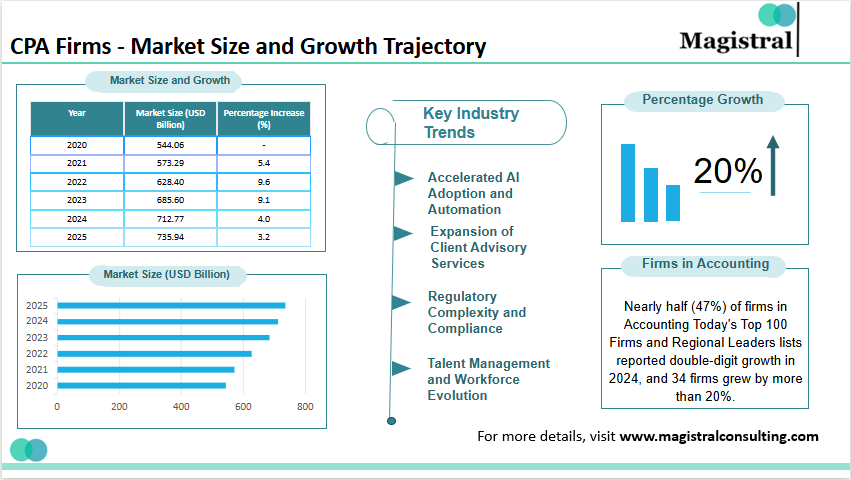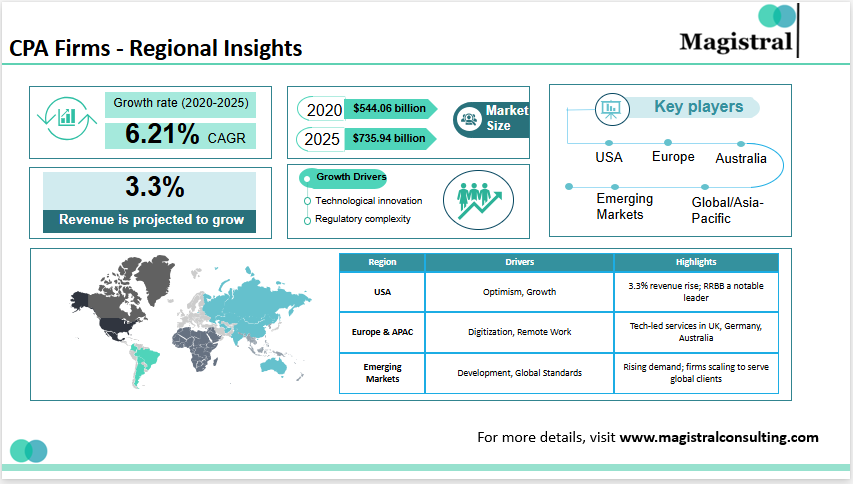The CPA firm scene is going through a big change in 2025 because companies use new tools more, clients ask for different things, rules get trickier, and how people want to work shift. The piece has a lot of deep talk, and Buzzards with the latest facts about CPA Firms now, with the big trends that are very important, the things they must use now, and words that talk about places with many of these CPA Firms.
Market Size and Growth Trajectory
From $544.06 billion in 2020, the global accounting services market for the year 2025 is pegged at $735.94 billion, showing continued strong growth.
Almost half, 47 percent, of all Accounting Today’s Top 100 Firms and Regional Leaders reported double-digit growth whereas 34 firms reported growth above 20% in 2024.

CPA Firms – Market Size and Growth Trajectory
Notable Growth Drivers
Here are some notable key growth drivers:
The rapid expansion of private equity investment is occurring due to its being the greatest unique private investment opportunity, as in 2024, half of the fastest growing firms were PE-backed and some seeing rates exceeding 100% growth. One company – Crete Professionals Alliance – saw an unheard-of growth rate of 310%.
Big-growth firms scaling and diversifying operations with a degree of independence are also heralding acquisition strategies which are said to be more efficient.
Key Industry Trends in 2025
Key industry trends in CPA firms are:
Accelerated AI Adoption and Automation
The Compound Annual Growth Rate for accounting AI investment is forecasted to be 42.5% by 2027.
Generative AI is now used for client communication and data analysis, automating financial reporting as well as fraud prevention.
Automated workflows are eliminating manual tasks such as data entry and reconciliation, allowing CPAs to dedicate more time to advisory services.
Expansion of Client Advisory Services (CAS)
80% of accountancy firms report increased requests for advisory services like consulting on financial planning, business strategy or technology.
The need to strategically navigate rapidly evolving modern technologies amid economic uncertainty and rising costs drives this change.
Regulatory Complexity and Compliance
Amongst regulatory changes, 51% of firms treat this as their greatest challenge, which points out to continued importance of compliance and education.
Considering the regulatory changes, especially in tax policy, and financial reporting standards, the firm is required to further invest in technology and train people.
Talent Management and Workforce Evolution
While considering top talent management, standards for flexible working methods should be set, alongside professional development and state-of-the-art technology.
Developing talent markets beyond the traditional geographical boundaries of firm culture due to the existence of a remote and hybrid working scenario.
Opportunities for CPA Firms
CPA firms have multiple opportunities, some of them are listed below:
Technology-Driven Service Expansion
Firms investing in AI, automation, and cloud-based platforms offer services more efficiently and in a more data-driven fashion to gain a competitive edge.
Technology adoption allows CPA firms to give real-time insights and act proactively in advisory, so the client moves from compliance into strategic partnership.
Advisory and Consulting Growth
The demand for CAS is expected to continue rising, presenting opportunities for firms to diversify revenue streams and deepen client relationships.
Areas like ESG (environmental, social, and governance) reporting, risk management, and consulting on digital transformation stand out as prime areas.
Mergers, Acquisitions, and Private Equity
PE-backed consolidation is reshaping the industry, allowing firms to scale rapidly and access new markets while maintaining specialized service lines.
Strategic M&A activity is especially prevalent among regional leaders and high-growth firms, enabling them to offer broader expertise and resources.
Regional Insights for CPA firms
CPA firms and their notable growth insights in different regions.

CPA Firms – Regional Insights
United States
The U.S has the largest market share for accounting services where CPA executives remain extremely optimistic about the economy in 2025. Two-thirds remain positive about the U.S economy, which is a sharp increase from prior quarters.
Revenue is expected to increase by 3.3% within the next year, which is the fastest rate since 2022. There is also a three-year high expectation in profit.
Regional players like RRBB in the Mid-Atlantic are acknowledged for their impact on clientele, industry client services, and their enduring adaptability to industry changes.
Europe and Asia-Pacific
Digitization with conformity of regulations are major focus points while firms concentrate on borderless cross advisory, international tax, and compliance services.
The growth of remote work allows firms to serve clients in different regions. Technology adaption has increased more so in the UK, Germany, and Australia.
Emerging Markets
The developing economies of Southeast Asia and Latin America are driving the need for advanced accounting, audit, and advisory services.
Businesses in these regions are adopting global standards of international client engagement through modernization and talent procurement.
Case Study: Regional Leaders and Growth Strategies
Case Study related to CPA Firms
RRBB (Mid-Atlantic, U.S.)
RRBB’s inclusion in The Accounting Today 2025 Regional Leaders list demonstrates the firm’s responsiveness to client needs, indicator of client service success, as well as depth of expertise in tax, audit, advisory, outsourced CFO services, and industry client trends.
The firm’s growth is firmly based on enduring client relationships sustained by providing strategic advice along with meticulous, personalized care.
Fastest-Growing Firms
The spending growth of private equity and acquisition-led organic growth are showcased by Crete Professionals Alliance, Ascend, and Spring line with measurable outcomes; some even attaining triple-digit annual growth.
Such firms can act parallel to operational autonomy by using capital to construct scope and diversify service lines.
Future Outlook and Strategic Recommendations for CPA firms
Below is the outlook of how they help in Embracing digital transformation, expanding advisory capabilities and more.
Embrace Digital Transformation
Other firms must thus concentrate on the deployment of money in advanced AI, automation technologies, and cloud computing. It is to bring about improvements in operational efficiency and accuracy, culminating in the enhancement of client value.
They also aid in enabling collaboration across geographical boundaries so that the firms can render services to clients all around the world.
Expand Advisory Capabilities
With change in client demands, companies are supposed to grow beyond compliance into competencies of business strategy, management consulting, technology, and industry-specific advisory.
Existing firms can set themselves apart in a competitive marketplace by becoming specialists in high-growth and high-demand areas such as ESG, cybersecurity, and digital transformation.
Foster a Flexible, Inclusive Culture
Companies should allow flexible work arrangements and nurturing professional development alongside building an environment conducive to collaboration and innovation for attracting and retaining talent.
Businesses should use technology to support hybrid working while uncapping career progression.
Leverage M&A and Strategic Partnerships
Mergers and acquisitions and strategic alliances with technology providers or niche consultancies will be mechanisms for rapid growth and diversification of service capabilities.
PE investments bring capital and operational expertise but require consideration of cultural fitness and strategic alignment.
Services offered by Magistral Consulting for CPA firms
The following services are offered by Magistral for CPA firms:
Transactional Accounting
Magistral helps CPA Firms manage payments, invoicing, collections, and transaction processing, ensuring GAAP-compliant checks and accurate records.
Statutory Accounting & Tax
They handle financial statements, debt schedules, cash flow reporting, tax compliance (direct/indirect), and statutory filings across global jurisdictions.
Advisory Services
Magistral supports finance transformation, technical accounting, market entry, and tax planning—streamlining processes and enhancing client value.
Outsourced Bookkeeping & Payroll
The firm offers reliable bookkeeping, payroll processing, and reconciliations, enabling CPA firms to reduce overhead and focus on client-facing work.
Financial Reporting & Analysis
Magistral prepares customized management reports, dashboards, and variance analysis to help CPA firms deliver strategic insights to their clients.
About Magistral Consulting
Magistral Consulting has helped multiple funds and companies in outsourcing operations activities. It has service offerings for Private Equity, Venture Capital, Family Offices, Investment Banks, Asset Managers, Hedge Funds, Financial Consultants, Real Estate, REITs, RE funds, Corporates, and Portfolio companies. Its functional expertise is around Deal origination, Deal Execution, Due Diligence, Financial Modelling, Portfolio Management, and Equity Research
For setting up an appointment with a Magistral representative visit www.magistralconsulting.com/contact
About the Author
The article is authored by the Marketing Department of Magistral Consulting. For any business inquiries, you can reach out to prabhash.choudhary@magistralconsulting.com
How do private-equity investments influence the growth of CPA firms?
Private-equity investments are fueling much faster growth and much more consolidation-allowing firms to scale faster and diversify their services on the other.
Why is advisory work driving more revenue?
Clients want strategic advice on financial planning, technology implementation, and ESG issues-beyond basic compliance work.
What are the challenges faced by CPA firms?
Firms deal with talent scarcity, regulatory pressure, and the need to implement new technologies effectively.
How do CPA firms adapt to technology?
Firms invest in AI, automation tools, and cloud platforms to improve efficiency, provide real-time insights, and enhance client service.